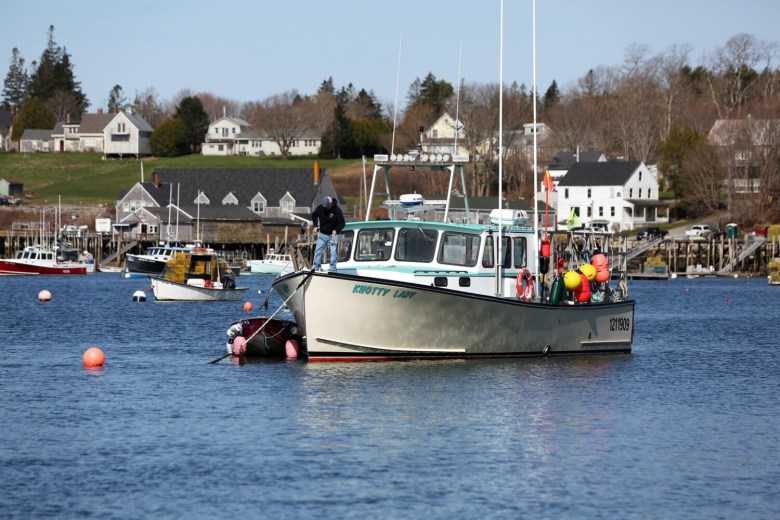Knoep Nieuwkerk of Kennebunk has been a fisherman in the Gulf of Maine for 30 years. He catches lobsters, pogies, and groundfish, and participates in many other fisheries.
I was not born into a fishing family. But fishing is what I was born to do. I had to fight for everything. I taught myself how to catch lobster, fix an engine, and keep my business afloat when everything was working against me. I fought rough seas, bad luck, and sometimes my fellow fishermen for bottom. I lost a lot of traps along the way. But in the end, we always fought together when others tried to cheat us.
Maine’s lobster fishery is at a tipping point. We need our leaders to fight alongside us, not with the big-money, foreign-controlled industrial fishing fleets that are tearing our fisheries apart. That’s not what happened recently at the Atlantic States Marine Fisheries Commission (ASMFC).
I’m one of 5,000 lobstermen the Maine Lobstermen’s Association says contribute 10,000 jobs and $2 billion to our economy. Our future should be important to our leaders, but I watched as they voted with the big boats in the face of data showing that the Atlantic menhaden fishery — and everything it supports, including our fishery — is in trouble.
The only winners were the massive vessels controlled by a Canadian seafood conglomerate that is vacuuming up these small foraging fish, menhaden, by the billions, grinding them into fish meal used as pet food and feed for their salmon farms. It’s called “reduction fishing,” but I call it a waste. We need those fish for bait in the lobster fishery.
There’s another fishery even more valuable than ours that needs menhaden too. Menhaden are the primary food for striped bass, the most important saltwater game fish in the country.
Lobstermen and striped bass fishermen have a lot in common. There are thousands of captains and guides who depend on healthy striped bass populations. They’re little guys too, and like us, their businesses create thousands of jobs and drive economic activity — $13 billion, according to the National Oceanic and Atmospheric Administration (NOAA).
But stripers are in big trouble, too. The ecosystem science the ASMFC spent years developing says they can recover if we leave more menhaden in the water for them to eat.
Siding with industrial fishing fleets is a disturbing trend.
When industrial midwater trawlers moved to New England, they collapsed our herring stocks and bait prices skyrocketed. Their big-money lobbyists chatted up fisheries managers and government scientists, who labeled falling stocks a “cycle” and kept quotas too high. These lobbyists must be good — they convinced NOAA to give their industrial fleet millions in “disaster relief” for the disaster they created. All we got was higher bait prices.
A similar story has unfolded for menhaden, a now critical source of bait for lobstermen. This may sound familiar, but Virginia takes a whopping 75% of the entire East Coast menhaden quota, and 90% of that goes straight to the industrial reduction fleet of Cooke-owned Omega Protein.
As the menhaden population started to decline, their lobbyists pressed the managers and scientists — a lot of the same ones who facilitated the herring collapse — to change their models and, like magic, there were more fish for even higher quotas.
The problem is, there really weren’t more fish.
Recently, government scientists were forced to admit some of their mistakes and told managers they needed to cut the quota by more than half. Instead of following this advice, they voted to cut it only 20%, which is larger than last year’s catch because even with a squadron of spotter planes and a fleet of ships, the reduction fleet couldn’t fill the existing quota.
It’s a bad sign when an operation like theirs can’t find fish to fill their quota. Also alarming is that the fish they’re catching are small, so they haven’t had a chance to reproduce.
Our fishery management system is broken.
Maybe I shouldn’t be surprised given recent history, but I don’t understand why our state and federal leaders and the organizations claiming to represent us side with industrial fleets. We create thousands more jobs and billions more in economic benefits than that single foreign-controlled fish meal company ever will.
The solution is simple: our leaders need to fight for us by eliminating industrial fishing for baitfish. That’s what today’s science supports, and it should have started with the reduction fishery.
Doing so would leave more menhaden in the water for striped bass recovery, more available to ease the bait crisis, and more in the future as the resource rebounds. We need to protect the foundation of our fisheries and marine ecosystem.
I’m just a self-taught lobsterman from Maine, and even I can figure that out. But little guys like me need leaders willing to fight for us.
https://www.sunjournal.com/2025/11/11/fisheries-leaders-should-be-looking-out-for-maines-little-guys-opinion/
